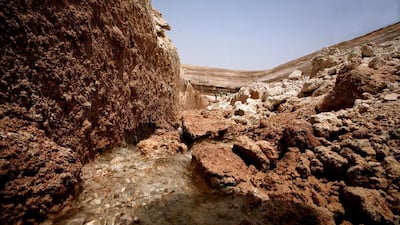An atlas that reveals the UAE’s underground water reserves will help to prevent people digging unlicensed wells, authorities said.
Officials at the Environment Agency Abu Dhabi said the map would help the country to deal with water waste and improve efficiency.
Agriculture and forestry projects are the largest water consumers by far, while sustained decreases in groundwater levels in some areas are a significant concern.
Levels have fallen by as much as 14 metres in Liwa Crescent, south of the capital, over the past 12 years.
“This atlas is a crucial step to improve efficiencies by using groundwater to improve our sustainability,” said Dr Shaikha Al Dhaheri, acting secretary general of the environment agency.
“We are counting on several means to provide water, but groundwater remains the main source. In Abu Dhabi, it is a key strategic reserve.
“Unlicensed well digging has become a real threat to our reserves and water security is a key national priority.”
Almost 65 per cent of all water used in Abu Dhabi is groundwater, amounting to almost 2.1 million cubic metres a year.
Most of that supply flows from the Hajjar Mountains on the Oman border towards the Arabian Gulf.
Nearly 80 per cent of groundwater reserves in the capital is used for agriculture planting trees and irrigating them.
Some areas suffered from depleted groundwater levels in recent years, while others have bucked the trend.
Since 2010, data shows water levels in the town of Madinat Zayed have risen, as have other regions in the north-east.
___________________
Read more:
High and dry? Data has vital role in solving UAE water crisis
Special report: Abu Dhabi's dwindling water reserves charted in worrying Sorbonne research
___________________
“One of the challenges we face today is poor precipitation,” Dr Al Hosani said.
“That has created pressure on water reserves and increased consumption from agriculture. These pressures make it compulsory to look at measures to maintain water security.
“In the past we had difficulty implementing policy to limit the use of groundwater because we had limited data. That will change with this project.”
Scientists are looking for solutions to tackle the issue, too, with one idea, floated by the International Centre of Biosaline Agriculture, being genetically engineered crops that can be irrigated with seawater.
Technology such as vertical farming, which grows crops using hydroponic systems that recycle water, are another possible solution.
During Abu Dhabi Sustainability Week, experts warned the public that water was not a “gift from the sky” and some hotels and malls must do more to preserve the scarce resource.
They suggested that new regulations, which could involve the compulsory retro-fitting of buildings to make them more water efficient, could be rolled out more widely across the country as well as an increase in water prices to teach people that it is a valuable resource.
The UAE’s water use was recently described as a “huge concern” by a government minister as it is among the most arid countries in the world.
Demand for groundwater is so high that a UAE University report in 2015 warned that water supplies in the country could be depleted within the next few decades.


